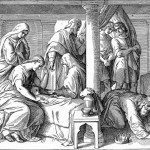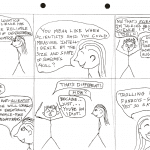![]() This past Sunday, I preached on the Second Coming of the Lord – asking “what is the Second Coming, and what does it mean to me?” Give it a listen. This sermon was a tough one – the first draft was double the length it needed to be, so there was a fair amount of painful cutting. I always find it particularly hard to cut Scripture passages; maybe posting these sections here will help assuage the pain a little. The first section I cut way back was on the Lord’s words about His purpose in His first coming:
This past Sunday, I preached on the Second Coming of the Lord – asking “what is the Second Coming, and what does it mean to me?” Give it a listen. This sermon was a tough one – the first draft was double the length it needed to be, so there was a fair amount of painful cutting. I always find it particularly hard to cut Scripture passages; maybe posting these sections here will help assuage the pain a little. The first section I cut way back was on the Lord’s words about His purpose in His first coming:
Throughout His life, the Lord was doing two main things. First of all, He was glorifying His humanity – that is, He was replacing everything that was merely Human with a Divine Human. By doing this, by changing the way He could related to humanity, by bringing about a closer presence not only with people in this world, but also with the angels of heaven – He drew nearer to the evil as well as the good, and caused a judgment to happen on those evil spirits who had been infesting heaven. That’s why we read in passages like John 12:31, “Now is the judgment of this world; now shall the prince of this world be cast out.” What brought that about that casting out of hell? The presence of the Divine in the Human; just a little earlier in that chapter, we read that Jesus said, “The hour is come that the Son of Man should be glorified” (John 12:23), and that glorification is the union of the Divine and the human within Himself.
The Lord’s words in that chapter highlight one more thing: that His coming was not the coming that the Jewish people had been expecting. They had expected a Messiah who would come as a worldly king, who would literally sit on the throne of David and raise Israel up above every other nation. And it’s no wonder – that’s what the prophets literally predicted. And yet in that chapter of John where He spoke of being glorified and judging Satan, the Lord also spoke of His own death and resurrection. According to the Jews readings of Scripture, that had never been part of the plan. And so when He said to them, speaking of His death and resurrection, “And I, if I be lifted up from the earth, will draw all to Myself” (John 12:32) they were confused. We read, “The crowd answered Him, ‘We have heard out of the Law that Christ remains for ever; and how can You say that the Son of Man must be lifted up?’” Jesus’ coming, according to Himself, was to involve death, and rising into heaven, and calling all to Himself – a reference to that raising of a New Church that we mentioned earlier as a hallmark of every coming. Later, in response to Pilate’s questioning about whether He was a king, Jesus said, “My kingdom is not of this world” (John 18:36).
The second section, which I ended up cutting completely, was on the Lord’s words about His return:
The Lord’s incarnation and resurrection remains unique in the history of His comings. He did it once; He does not need to do it again. The power he took on at that time has not left Him. And yet, even while in the world He predicted that He would need to come again. He predicted that after a time, hearts would grow cold, and that men would turn away (e.g. Matthew 24:12). And He said, He would return. He would return to give further revelation – He said to His disciples, “I have spoken to you in figurative language; but the time is coming when I will no longer speak to you in figurative language, but I will tell you plainly about the Father” (John 16:25). He would return to bring judgment to the evil – He said, “”When the Son of Man comes in His glory, and all the holy angels with Him, then He will sit on the throne of His glory. All the nations will be gathered before Him, and He will separate them one from another, as a shepherd divides his sheep from the goats” (Matthew 25:31-32). And He would return to renew His kingdom – He said, “And the Son of Man will send His angels with a great sound of a trumpet, and they will gather together His elect from the four winds, from one end of heaven to the other” (Matthew 24:31).
There. If you read those before (or after) listening, I’ll feel much better about having provided enough Scriptural grounding for the sermon.
(Image is a Greek icon of the Second Coming; http://commons.wikimedia.org/wiki/File:Icon_second_coming.jpg)












